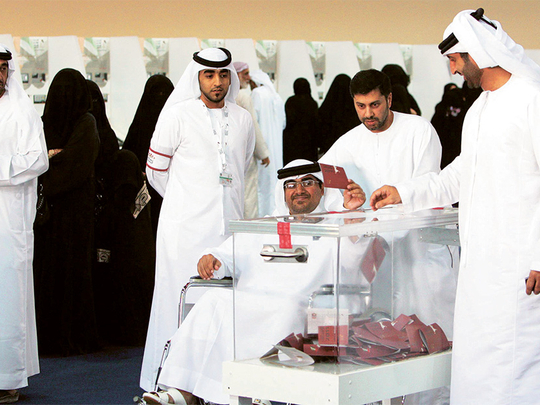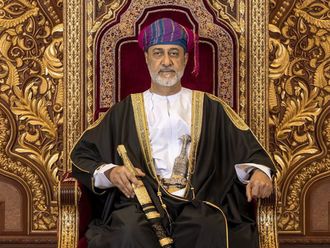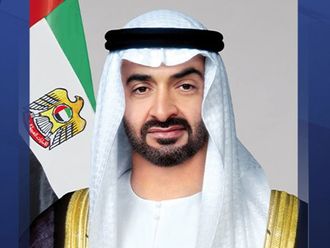
Abu Dhabi: The UAE has, over the past decade, laid the foundation for universal suffrage — that is, the right of every citizen aged 18 to vote.
The upcoming 2015 parliamentary elections on October 3, the third in the nation’s history — will see, for the first time, a single-vote system, a judge to lead the panel that will hear appeals, overseas ballots, and a wider awareness campaign to improve turnout — it will witness, for the first time, greater political participation, and achievable universal suffrage.
The parliamentary process started as early as 2006, when the first electoral pool of about 7,000 Emiratis was selected to vote. The number was small compared to the population of Emirati citizens, which amounts to a million people. But because at the time a database of eligible Emiratis voters wasn’t available, some of the Emiratis appearing on the electoral rolls in 2006 were not strictly eligible — in fact, they were later found to have died.
But in 2011, the introduction of the Emirates ID programme dramatically changed this picture; then a database of Emiratis eligible to vote was available, and could be used to allow even more Emiratis to vote. In the second round of FNC elections, about 130,000 Emiratis were granted voting rights, an increase of about 18-fold. But turnout was not as expected: whereas in the first round more than 74 per cent of the selected electoral pool voted, in the second round the number petered down to under 30 per cent, seemingly indicating a loss of interest in voting. University professors, notably, did not make the cut and almost not one of them was granted the right to vote. Excluding opinion leaders contributed to the lowered turnout, as did the lack of campaigning to raise awareness.
This year’s elections, set to be held on October 3, however, will witness a wider awareness campaign to educate the people about the vital role of the FNC and instill the culture of democracy in them. And more polling stations have been set up across the country, making it easier for voters to cast their ballots, and if voters happened to live outside the UAE, overseas ballots — also introduced this year — will allow them to lodge their ballots as well.
Dr Anwar Mohammad Gargash, Minister of State for Foreign Affairs and Minister of FNC Affairs, has told the council during a discussion on the country’s election this year we will see a bigger turnout for the FNC elections, compared to previous elections, for the 40-member house.
“This year we expect to see a big turnout. We are also planning to increase the number of voters,” Dr Gargash, who is also the Chairman of National Election Committee, told the house.
The minister added that the 2015 election for FNC will be a big boost to the parliamentary elections process in the region with larger participation of the people. “Hopefully, each and every Emirati will take part in the 2015 elections,” he said.
Dr Gargash said the FNC Affairs Ministry will also launch a campaign to bring more people on board to participate in the 2015 election. “The FNC has been a great forum for public-to-government interaction. The UAE’s decision to bring the general people in government decision-making has helped the nation take great strides in policy-making. Therefore with the expanding the pool of eligible voters, we will make further strides in democracy,” Dr Gargash told the Council.
Dr Gargash also said that the new elections guidelines have defined polling stations as the place determined by the NEC for members of the electoral body to vote, both within and outside the country. The electoral rolls will include names of eligible voters in the UAE and abroad.
A single-vote policy has also been introduced, allowing each voter to vote for one candidate in his emirate.
Previously, voters were allowed to vote for as many as half the number of seats from their respective emirates. A voter from Abu Dhabi, for instance, could vote for four candidates, as the capital city holds eight seats in the Council. As a result, three out of four candidates voted in from Abu Dhabi were from the same tribe; their kin could vote for all three of them simultaneously. To boost confidence in the elections process, a judge will head the appeals committee which will investigate the complaints of candidates. Stressing that elections will be conducted with the highest levels of transparency, Dr Gargash said the operational instructions will contribute to bring together all the parties in the electoral process and increase the confidence in the elections and its outcome.
The rules state that the Appeals Committee will be headed by a judge, and will include two members with experience and competence to examine all electoral appeals both with regard to nomination of candidates and the voting process and results. The Appeals Committee will report the legal opinion to the NEC. In the previous elections, the Appeals Committee was headed by the Minister of Justice (a member of the National Election Committee).
One of the most prominent amendments in the new elections guidelines is the introduction of a cutting-edge Counting Committee, which is a central committee headed by the Chairman of NEC with membership of experts competent in the following tasks: counting votes using electronic voting system, announcing the results, and identifying a list of reserve members in each emirate.
Now the scene is set for universal suffrage — a scene which has been in the works for about a decade, a philosophy of “gradual progress” which the UAE adopted to initiate democratic practices at a steady pace, and in doing so, stave off the turbulence fellow Arab states were plunged into when they undertook this same process. The UAE’s conviction is that change does not accommodate haste, and that careful, gradual planning does not preclude impressive results; on the contrary, ambitious but ill-thought out strategies could be detrimental to a country’s stability.
Ahmad Obaid Al Mansouri, a member of the FNC from Dubai, believes that restricting voting rights to certain Emiratis was not meant as exclusion, but was due to lack of preparedness on the part of the country’s institutions.
He expected that the pool of eligible voters will be greatly expanded hopefully to universal suffrage, given the fact that the pool of voters was expanded from less than one per cent of the Emirati population in 2006, to twelve per cent of the population, in the 2011 elections, in one go. “So the numbers indicate that the upcoming elections will almost see universal suffrage,” he said. Al Mansouri also expected that the turnout in the forthcoming elections will exceed 60 per cent, based on the wider political awareness, and understanding of the vital role played by the FNC, and institutionalisation of the election process.
Ali Jasem Ahmad, a veteran member of the House, said the new guidelines for the 2015 elections will facilitate the successful implementation of the polls, and reflect positively on the development of the country’s political process.
“The new polls rules are indicative of the UAE Government’s desire to promote greater participation and transparency in the 2015 elections,” Ahmad, a member from Umm Al Quwain, said.
‘Increase turnout’
He welcomed the new voting system in which each voter will be able to vote for one candidate in his emirate, saying voters should feel that the candidate for which they are voting is worthy of support and the House should be seen as a useful authority.
Mosabah Saeed Al Katbi, a member from Sharjah, particularly welcomed increasing the number of polling stations and said it should be easier for citizens to vote.
In the Central Region, there are more polling stations. “More polling stations in each emirate, with less of a journey involved, will help to increase turnout,” Al Katbi said.
Al Katbi expressed the hope that with turnout nearly 28 per cent in the previous elections, this time there’s certainly scope for improvement.
Ali Eisa Al Nuaimi, a member from Ajman, said the Appeals Committee being headed by a judge will reflect positively on transparency of the new elections.
Al Nuaimi also welcomed the introduction of a Counting Committee, which is a central committee headed by the Chairman of NEC with membership of experts competent in the following tasks: counting votes using electronic voting system, announcing the results, and identifying a list of reserve members in each emirate.
Stressing that the FNC has shown its determination to become more effective in the present legislative term, with ministers being called to account and with a raft of proposals for new legislation, Al Nuaimi said once voters believe the House is doing a great job, they are more likely to participate in the elections and vote.
Al Nuaimi particularly welcomed the fact that the Emirates Committees are granted more flexibility in the formation of subcommittees with the approval of the NEC on the administration of elections.










